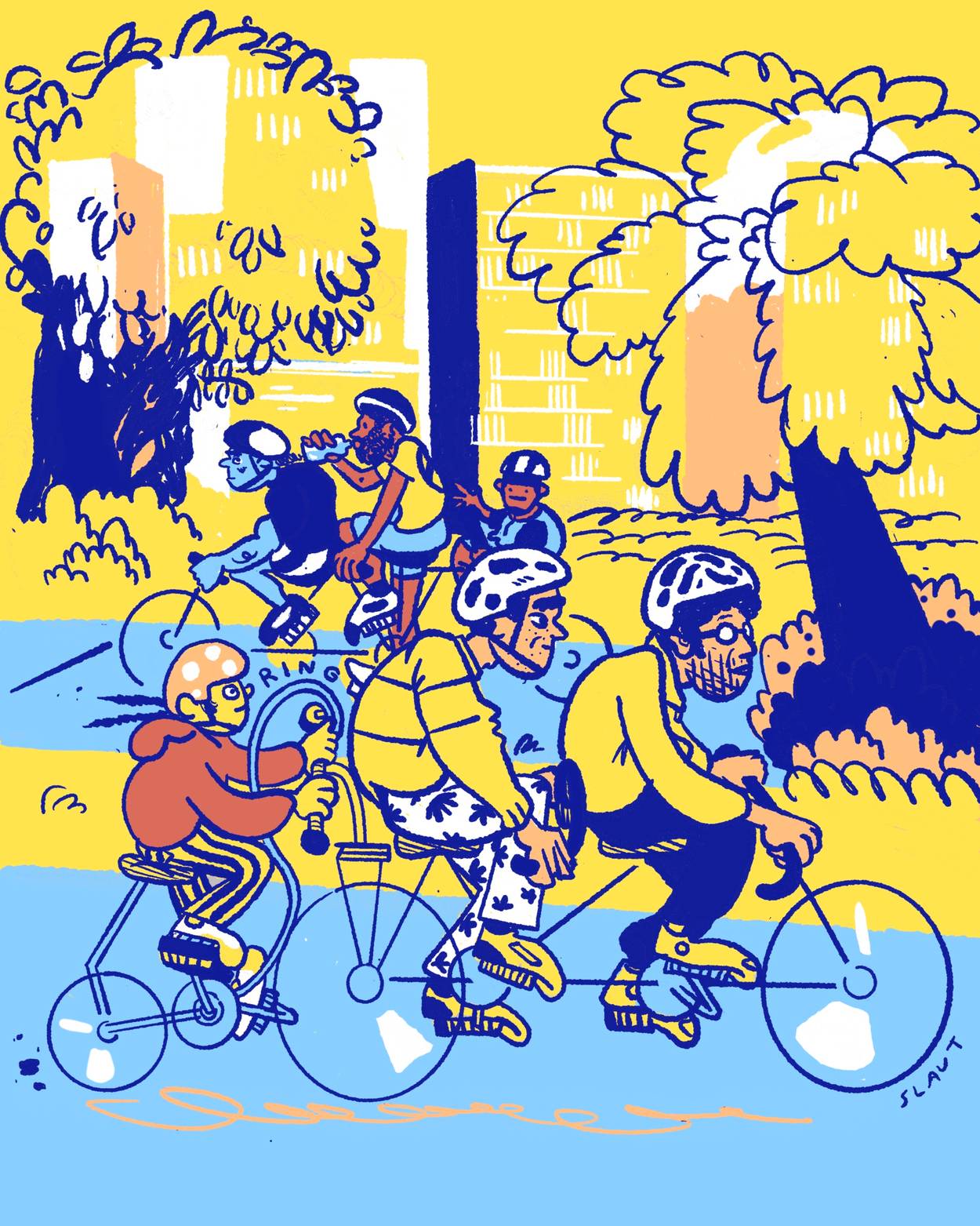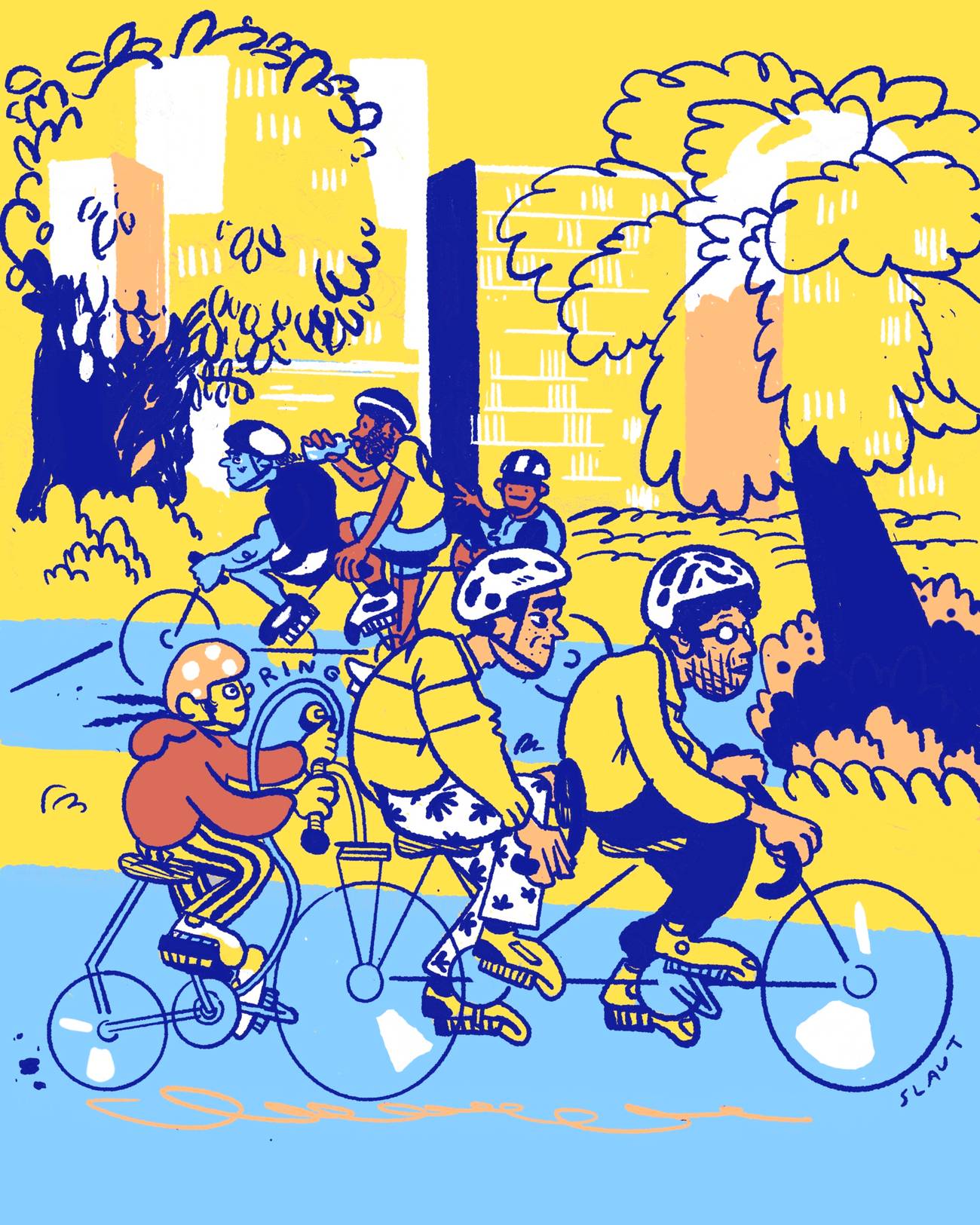Tel Aviv’s Gay Dads
As more Israeli gay men become fathers, parenthood is emerging as the great gay equalizer




In the middle of a recent two-week trip to Tel Aviv—a city where I lived for many years, many years ago—I suddenly realized why I felt oddly content, oddly validated, oddly accepted. Nearly all of the gay men I spent time with were dads like myself. My hip hotelier buddy and his creative director husband: Their daughter just celebrated her bat mitzvah. My old friend, a diplomat and former ambassador: His son is now 8. The hunky media dude I encountered one unbearably humid evening: dad to a daughter and son. And my ex-partner, the conductor and pianist: a father to 7-year-old twins—just a year older than my own twin sons.
Unlike back home in New York City, gay fathers seemed to be everywhere in Tel Aviv. Some were married to men, others divorced from women, others co-parenting with lesbians or straight female friends—and all with minimal fuss or fanfare (or at least no more fuss or fanfare than heterosexual parents). As I joined them for coffee dates and play dates and pool dates, we spoke about summer camp and monkeypox, Beyonce and back-to-school—a mashup of parent life and queer life so natural, so organic, so easy and free-flowing that all I could think was: “This is how straight parents must feel all of the time.”
For me, Tel Aviv and its community of gay dads felt nothing less than sublime. As someone who’s not just gay, but also Black and Jewish, I’ve spent my entire life searching for folks who look or live or love like me. In Israel—a place where I’m finally, mercifully not always the darkest Jew in the room—I’ve found some of that belonging on an ethnic level. But being among so many other gay parents elevated these connections to a truly existential level.
And it seems I’m not the only one who feels this way. A recent study detailing the experiences of LGBT parents in Israel demonstrated a direct link between child-rearing and a strong sense of core fulfillment and satisfaction, particularly among men. The study—one of the most detailed ever conducted to explore LGBT parenthood—revealed that gay fathers are actually happier than their heterosexual counterparts, with lower levels of depression and higher levels of overall “life meaning” and “life purpose.” LGBT parenthood, the study noted, has also helped erode the stigma associated with being LGBT in less urban, less “progressive” parts of Israel (the country’s equivalent, you might say, of “flyover” or “red” states).
In other words, many gay fathers in Israel feel much as I felt there: happy, purpose-driven and supported. Most crucially, becoming fathers (and mothers) has helped elevate the status of LGBT people within larger Israeli society like no other social or political advancement. Even more then marriage or anti-discrimination laws, parenthood, it seems, has become the great gay equalizer.
Of course no one—neither myself nor the study’s authors—is suggesting LGBT people must (or even should) become parents in order to secure social equality. Equal rights are equal rights, regardless of having a kid or a puppy or a plant. But for those who choose to embrace it—and can afford it—parenthood can provide a particularly potent pathway to both cultural and personal acceptance for a group that’s historically had very little of either.
“At least in Israel, being gay or lesbian no longer seems to matter much anymore,” said Geva Shenkman, a clinical psychologist and professor at Reichman University who co-authored the parenting study with professors Dorit Segal-Engelchin and Orit Taubman Ben-Ari. “What matters is that you’re a parent—however or with whomever it happens.”
In my own case, even without the support of a vibrant, like-minded community, I’ve never felt more “regular” or “equal” than I have being a father. It’s an unprecedented feeling, coming as I do from so many intersecting identities. But after a lifetime of struggling with my blackness and whiteness and gayness, “dad” is the first identity that’s felt like an immediate and authentic fit.
Six years into dad life, fatherhood is like a pas de deux between feelings of acceptance I’d never imagined I’d experience and an inner battle to accept that I truly deserve to feel them. Of course I understand intellectually that everyone has a right to parenthood—perhaps the most basic element of the human condition. But for men like me—who came of age in the shadows of HIV and long before homophobia became not just unfashionable, but unacceptable—parenthood seemed little more than an impossibility, as much because of science as society.
After all, until very recently gay people (including in Israel) were not only denied access to our authentic selves, we were perceived as predatory, existential threats to traditional family life. For many of us, children were physically impossible, while for most of us, parenthood was deemed culturally unfathomable—even in a culture like Israel where family-building is a national obsession. True, times have certainly changed. But these feelings of otherness not only run deep—they are deep.
Parenthood, it seems, has become the great gay equalizer.
In Israel, at least, change has come via sources both old and new. There’s the biblical imperative to “be fruitful and multiply” that has resulted in Israel having the highest birthrate in the entire developed world—along with an aggressive demand for liberty and equality among the country’s secular, urban elite. For many Israelis, parenthood is as much a right as a commandment, regardless of gender or sexual identity. No wonder tens of thousands of (mostly straight) Israelis protested in 2018 to overturn a law banning surrogacy rights for single women and same-sex couples (the law was finally amended three years later).
Much like in the high-tech or culinary arenas, in the emerging battle to achieve fertility equality, Israel is clearly punching far above its weight. Indeed, the 2021 shift in surrogacy laws—while specific to Israel’s own medical and political establishments—confirms that all Israelis, regardless of gender, are equal in their right to becoming parents. Moreover, the government is equally obligated to help every citizen succeed in this journey. And along the way, the sheer normalization of LGBT parenthood in Israel appears to have created a ripple effect across Israeli society, so much so that many now wonder if LGBT people in Israel (and other nations where gay parenthood is now increasing) will ultimately feel the same level of pressure as straight people to reproduce.
For the moment, at least, Shenkman said such pressure still falls most heavily on Israeli women, whom, he says, have “reported stress related to social judgment” if they choose to remain child-free. But as more gay men become fathers, added Shenkman, “gay men will feel the social expectations to pursue parenthood … and may face the pressure of stigma” if they choose not to.
Jack Drescher, a clinical professor of psychiatry at Columbia University, suggests that such stigma—while certainly not inevitable here in the U.S.—could nonetheless help reshape how gay men mate, date, and relate. “We have more choices here in America so I’m not sure such pressure to have kids could happen to gay men here,” said Drescher, who works with a large gay male clientele in his clinical practice. “But what the specter of parenthood could certainly affect is how gay men meet up, form relationships, and consider their long-term life expectations. There will always be groups of gay men who are focused on the sexuality of being gay, with little interest in becoming parents, but there are others whom being gay is just like being straight and want those types of heterosexual values and norms.”
Although there is not yet any hard data confirming that there are more gay fathers per capita in Israel than in the U.S., said Shenkman, anecdotal evidence seems to bear it out; and, according to existing studies, Israeli gay men are roughly 25% more likely than American gay men to possess “strong desires” to become parents in the future. The rise of gay fatherhood possesses an outsize opportunity to dismantle conventional thinking about sexuality, propriety, and, most importantly, identity. For as much as parenthood upends how straights think about gays, it forces us queers to reconsider how we think about ourselves. Are we revolutionaries or have we sold out? Are we charting a path for a new kind of gay existence, or have we simply succumbed to the unyielding demands of heteronormative conformity?
Although I certainly have yet to find the answer, I’m increasingly convinced it doesn’t really matter. Who cares why gay men like me have become parents—what is most crucial are the parents we are trying to become. In the meantime, that psychic “toll” of gay fatherhood was something I had not fully anticipated. Long after leaving the closet, for instance, we were compelled as gay parents to “come out” day after day (again and again) with teachers, doctors, and, most stressfully, other parents. And this often transpired in situations well beyond our control. I’ve found this both scary and empowering—an endless tussle with the unknown directly connected to the very essence of what makes us human, our children.
But I’ve also allowed this to be an opportunity to think hard about who I am as a man and a father and person. Surrounded almost entirely by heterosexual counterparts, even the most ingrained identity markers—including gay and lesbian—are eventually disrupted by the relentless, everyday-ness that is parenthood. Often in the midst of a playground or a meltdown—out of sheer bliss or perhaps exhaustion—I’ll almost “forget” that I am gay, or at least forget that being gay is supposed to matter. And isn’t that what we’ve always wanted from straight people as well? Is this how heterosexual moms and dads feel? Is this what’s happening with all my buddies back in Tel Aviv? Is this equality? It’s probably too soon to tell.
For the moment, at least, “what’s notable in Israel is that gay parents have so many other gay parents they can share their experiences with,” said Shenkman, and this matters—a lot. “Gay parents do not feel alone—they do not feel like the exception.” While I cannot say if I’ve ever felt entirely equal anywhere, in Tel Aviv, at least, I also no longer felt like the exception—neither as a father or a gay man or a Jew. Of course, I’ll never really know if this is how straight parents feel. But after a lifetime of oddness, becoming a dad has finally allowed me to feel just a little like everyone else—which for a “unicorn” like me is the only kind of equality that could ever truly matter.
David Christopher Kaufman is a writer and editor based in New York City who regularly contributes to The New York Times, the New York Post, The Financial Times, AirMail, and Monocle magazine.